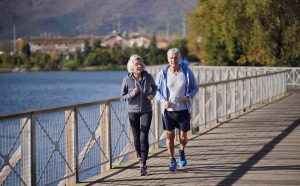
This is good news: not only can seniors prevent the onset of dementia with physical exercise, but with an exercise program seniors can grow new brain cells. In a previous post I wrote how the World Health Organization reviewed measures for preventing dementia. They found that aerobic exercise is the number one thing you can do. If you’re anything like me, this is pretty motivational.
I know it’s sometimes hard to get out of bed and go work-out or walk, but if it’s going to help me remember or learn new things by growing new brain cells, then I’ll do it.
The research demonstrates that consistent aerobic exercise (30 minutes every day) induces persistent beneficial behavioral and neural plasticity as well as healthy alterations in gene expression in the brain.
Some of these long-term effects include:
- Increased neuron growth
- Increased neurological activity (signaling)
- Improved coping with stress
- Enhanced cognitive control of behavior
- Improved memory
- Structural and functional improvements in the brain
What does this mean for seniors? The effects of exercise on cognition improve productivity, preserve cognitive function in old age, prevent or treat certain neurological disorders, and improve overall quality of life.
Walk to Improve Your Brain
If your 30-minute walk gets your heart rate up in the aerobic exercise ranges of 60 to 70 percent of your maximum rate, you’ve halted some of the brain decay of aging. Most people will need to walk very fast to do that, or walk for a longer period. If you’re wondering about the details (and safety) of aerobic exercise for seniors, I wrote about it here.
How did they discover that seniors can grow new brain cells? In a study of sedentary seniors, one group walked 30 minutes every day for 12 months. Another spent 30 minutes daily in the gym doing stretching exercises. At the end of 12 months they were examined with blood tests, cognitive testing, and brain imaging. Only the group of seniors who walked showed positive improvements—including growth of new brain cells.
Exercise to Grow New Brain Cells
Neuroscientist Peter Snyder, a researcher at Brown University’s Alpert Medical School and Rhode Island Hospital, says the hippocampus is one of those brain areas that continues to form new cells and make new connections between cells. (The hippocampus is a crucial area of the brain involved in memory and learning.)
“What we’re finding is that of all of these noninvasive ways of intervening, it is exercise that seems to have the most efficacy at this point—more so than nutritional supplements, vitamins, and cognitive interventions,” says Snyder, who studies what we can do to maintain memory as our brains age.
Some of the most provocative evidence on the power of exercise on the brain comes from a study published in the National Academy of Sciences by neuroscientist Art Kramer at the University of Illinois at Urbana-Champaign. Kramer and his colleagues have documented the impact of exercise on the growth of the hippocampus in a small group of elderly people over the course of one year.
“The participants in our study were 120 very sedentary people,” Kramer says. All the participants in the study had MRI brain scans done before the study began and again a year later when the study ended. Then the researchers analyzed the MRI data.
“What we found,” Kramer says, “was that individuals in the aerobic group showed increases in the volume of their hippocampus. The increase in volume— again for the aerobic but not for the non-aerobic group—was about 2 percent. The 2 percent increase we can think of as turning back the clock about two years,” Kramer says. By comparison, “the individuals in the control group—in the toning and stretching group—lost about 1.5 percent [of their hippocampal volume], so we can think of it as about a 3.5 percent difference compared to those individuals who didn’t benefit aerobically.”
Great News for Seniors
The evidence that exercise is good for the brain isn’t limited to seniors, of course. But it is more significant because it will counteract the decaying processes which accelerate as one gets older. Even if only a small percentage of new brain cells grow after exercise, it makes a huge difference to older people who normally would be losing cells regularly.
Not only will aerobic exercise help prevent dementia, it can help rebuild the brain and grow new brain cells. More incentive for me to take my puppy Molly for a walk!

Recent Comments